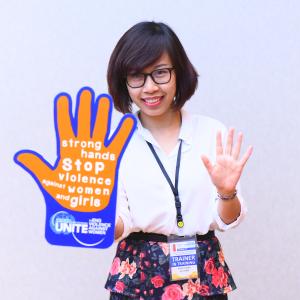Launching Essential services package for women and girls subject to violence in Viet Nam
22 November 2017
- Ha Noi, 22 November 2017 – Today, the United Nations in Viet Nam and Ministry of Labour - Invalids and Social Affairs (MOLISA) launched the Essential services package for women and girls subject to violence in Viet Nam.
The event brought together over 100 participants, including representatives from difference ministries, National Assembly, Socio-political Organizations, the UN in Viet Nam, bilateral and multilateral donors, as well as NGOs and the media.
The Essential Services Package (ESP) forms part of the United Nations Joint Global Programme on Essential Services for Women and Girls Subjected to Violence. This programme is a partnership by UN Women, UNFPA, WHO and UNODC which aims to provide greater access to a coordinated set of essential and quality multi-sectoral services for all women and girls who have experienced gender based violence. The Programme identifies the essential services to be provided by the health, social services, police and justice sectors as well as guidelines for the coordination of Essential services and the governance of coordination processes and mechanism. This global programme is supported by the Governments of Australia and Spain.
Violence against women and girls is widespread, systemic and culturally entrenched. According to a 2013 global review by the World Health Organization (WHO), 35 percent of women worldwide have experienced physical and/or intimate partner violence or non-partner sexual violence. It is estimated that one in five girls has been abused in childhood with estimates from some countries as high as one in three. in Viet Nam, the National Study on Domestic Violence against Women, released by the General Statistics Office and the United Nations in Viet Nam in 2010, showed that 58 per cent of ever-married women had experienced at least one form of violence (physical, mental or sexual) at some point in their lives. Approximately 50 per cent of victims did not tell anyone about the violence they endured, and 87 per cent did not seek help from public services.
Speaking at the launching workshop of the ESP in Ha Noi, on behalf of the UN in Viet Nam, Ms. Elisa Fernandez, UN Women’s Head of Office in Viet Nam stated that “Violence against women and girls is not inevitable. The good news is that there are many ways to prevent violence in the first place and to stop cycles of violence repeating. The provision, coordination and governance of essential health, police, justice and social services can significantly mitigate the consequences that violence has on the well-being, health and safety of women and girls’ lives. They are essential in assisting the recovery and empowerment of women, and stopping violence from reoccurring. This is exactly what the ESP aims at delivering.”
“The guidelines will help to ensure that the range of services across different sectors can provide the necessary level of support and response to everyone with no exceptions. For the services to be accessible, survivor’s dignity and safety must be placed at the center because these services are the frontline of response to those whose lives have just been ruptured” she added.
The ESP comprises six overlapping modules including (1) Overview and Introduction; (2) Health Essential Services; (3) Justice and Policing Essential Services;(4) Essential Social Services;(5) Essential Actions for Coordination and Governance of Coordination and (6) Guidelines on implementation. In the coming time, MOLISA, Ministry of Justice, Ministry of Public Security and Ministry of Health and the UN in Viet Nam will pilot the ESP in one province in Viet Nam.




